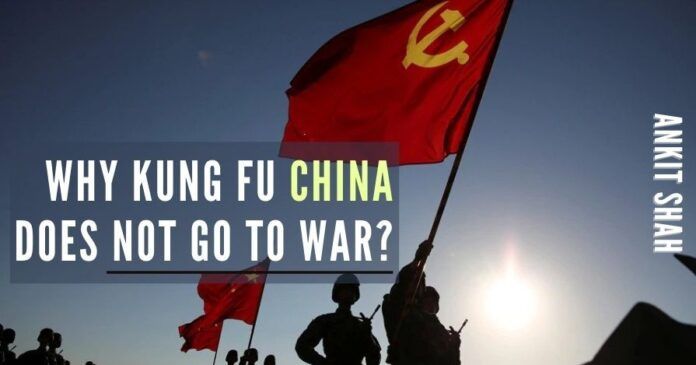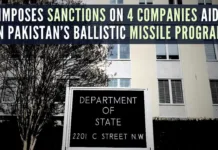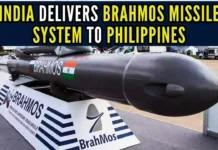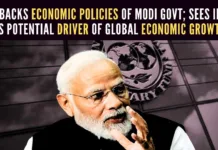
China uses unpredictability in policy and warfare
When push came to shove on the nights of the week ending August from the Indian side, the People’s Liberation Army (PLA) stunningly retreated. As a result, India occupied several high positions at the face-off venue. This was a second loss of face for the Chinese after the Galwan debacle. There is not one country that does not want to see an India-China war. If any of these two countries are intent on war, there is no one stopping them. China generally does not attack a prepared enemy. Why would it delay, let India prepare, and cancel out or toughen the winning probabilities by the sheer strength of numbers that it has?
Let’s look at Why does a mighty PLA keeps maintaining the no-weapon use policy with India at the border despite several drubbings:
- When a country does not have some bare minimum of democratic values, it isn’t a surprise that the majority of its security forces has to concentrate inwards rather than outside. The Chinese PLA is not a battle-hardened force, with any big war experiences and does not have any kind of operational records to showcase, except for arm-twisting the armless citizens inside China.
- The Chinese forces are made up of 70% of the single child of their parents. Single children are considered not only pampered but also unfit for army jobs for psychological reasons. Even physiologically the PLA men do not match with average vital statistics of the armed forces of most countries in terms of height, weight, and physical endurance. Many of them cannot sustain at the heights of Tibet or the Himalayan winters even for a football match without a regular oxygen supply.
- With massive unrest and anti-CCP sentiments in various pockets of China, it is very likely that in an event of war, the parents of these single child army men would implode the country from within. No parent would want their only child sacrificed for the cause of strengthening a political party instead of a nation.
- All PLA members are Communist Party members. It is something unfathomable for armed forces in any country of the world to have complete alignment with one political party. What this also implies is that the promotions in the forces are at the mercy of loyalty and allegiance to the party leaders rather than being based on merit or military capability. This is one of the most suicidal features of the Chinese army in a war scenario because if the Generals give up, the men would follow.
- The Generals of the PLA are also transferred more frequently than any other armed forces in the world. These transfers are ordered at the whims of the party without any military cost-benefit calculations of the decisions. This literally stems out from the political requirements of the leaders in power to keep the control continuing rather than for any military betterment objective.
- The PLA is not immune to the purge which the so-called ‘Chairman for life’-to-be Xi Jinping is continuously rolling out. He initiated the so-called reform of the PLA as a tool for the purge of top generals whom he doubted to be against his policies. An armed force involved with the political or business ambitions of the few in the governance is a disaster because their control alignment with particular factions would impact the performance at war. The dependence of several army generals on separate political heads sitting in Beijing for making battlefield decisions is dangerous. You never know which faction in the army could be interested in losing the war.
- The Chinese army has a few bilateral friends to boast of. It is a pariah in the parlance of “Joint War exercises” with modern forces of the powers of the World, particularly the West. It is not allowed to mingle and kept in total isolation from the ‘command and control’ and ‘operational insights’ of modern warfare. Perhaps, this can be attributed to the lack of trust factor of the Chinese polity among the comity of nations. Barring Pakistan, North Korea, and little crumbs of Russian military experience sharing, the PLA stands home alone!
- About 20% of the total training time of the PLA goes into learning communism of Lenin & Karl Marx. Domestic political compulsions of aligning the PLA with the party are costly beyond doubt. Even the countries where Lenin & Marx belong don’t do this to their forces. The quantity of toys and men does not work on the actual battlefield. It is more about the fight in the men, which is a qualitative aspect.
- Opening up multiple theatres at a time, being belligerent to all the neighbours, and weaving them together to pose a united anti-China economic and military front doesn’t look like a war strategy either. The war principles of Sun Tzu probably did not inform the Chinese about the importance of sequence in a long-term war plan or that the principles would back-fire if applied on its own citizens first.
- Repeated failures to acknowledge the number of martyrs after a fight, suppressing information from parents and citizens about the PLA attempts at the borders, and refusing the last honors of the supreme sacrifice of the martyred, kills the morale of the forces furthermore. News of more loss at borders would incite a backlash among the citizens and more questions on the CCP-PLA tango. A loss of face worldwide can cause the demand for dilution of the power of Xi Jinping within the powerful Politburo of the party.
Rogue regimes are experts in information warfare, mostly meant for domestic consumption and manipulating public opinion. For external handling, Beijing uses unpredictability in policy and warfare. It is important to note that unpredictability works only until the other side remains predictable to you. Surprises like the one given by India at the standoff in Ladakh will inspire several other tiny neighbours to try the dragon. China’s ventures in the SCS is proving to be too early and at the Indian borders, probably too late. These strategic miscalculations prove that the People’s Liberation Army is too busy liberating people inside China to be ready for the dynamics of full-spectrum war outside.
Note:
1. The views expressed here are those of the author and do not necessarily represent or reflect the views of PGurus.
- Did Mahabharat inspire to solve Terrorism in Myanmar? - October 21, 2020
- India-China Border settlement is a 10 Nations Project - October 5, 2020
- Why the Kung Fu China does not go to war? - October 2, 2020











Despite all the reasons and situations listed so well, one thing the Chinese are unable to PREDICT is the escalation levels.
Just as we cannot push Pakistan in a corner beyond a point, the Chinese cannot push us beyond a point that is the value of deterrence.
War of any kind needs a clear cut objective and an exit strategy. Against Pakistan we do have a clear aim while the Chinese have no such aim. The generalities of border disputes are vague and unlikely to motivate the Chinese army to stand-up to a defending army which has a clear motivation.
Unless the war drags on the Chinese numerical and material advantage is unlikely to yield dividends. But then if drags on it is also unlikely than others will not get involved this is the Chinese fear of UNPREDICTIBILITY.
I think the author has gone to the other extreme by belittiling the PLA. Most countries have been in awe of columns upon columns of goose-stepping Chinese soldiers, an armada of destroyers, tanks, artillery pieces etc. I do not for a moment suggest that we should take a leaf from them, but dismissing your enemy’s capabilities is a sure recipe to disaster. Let us be prepared for the worst and have the confidence in our armed forces and political class. If all that the author writes is true, the Chinese Generals and CCP will not rely on a frontal attack, but use far more insidous ways to harm their enemy. Openeing a fifth, sixth column within the enemy’s terrotory, disabling systems, hacking down computer-controlled devices and infrastructure, will be the way of someone who does not have the ability to attack directly.
Excellent Analysis Ankit ji. Please bring in more. Your analysis is relevant for the world to see and take note of.
CCP is facing an immense pressure from Pakistan to fight their war with India. India was consolidating making all Smart steps to reclaim PoK which would be detrimental to Pak. Interests besides disaster to their China-Pakistan joint CPEC overambitious, greedy venture. Under pressure from Pakistan, China wants to deviate India’s focus and energies drained in rock solid Ladakh to prevent India from hostile take over of PoK, Gilgitbaltistan and Baluchistan. China can afford to drain some funds to showcase their superiority. Their long range goal is to ensure total take over of Nepal and Pakistan as the grip of the dragon slowly tightens and not let them disintegrate in bits and pieces. War with India even if they win, will ruin China’s international trade with many countries at this juncture and China will not go for it at this time.
That’s what I call CONTENT! 😎
Why aren’t these shown by the media?
Brilliant analysis.
2 Child Policy has hurt only one Community
So this author is an authority on China. Please put his article on the top. Why this information is not in media? I was waiting to read him more after I read his 19 ways to counter china. Can we have his regular articles? His vision for India and on how to counter terrorism is what we need to read more.
China needs to deflect attention from the blunders made by Putin and shore up Xingping legacy by disputing border areas with frivulous historical claim. An aggressive posture will help Xitler appropriate Mao Legacy. All this border areas impass is part of the strategy of Xingpimg to shore up his acceptance.